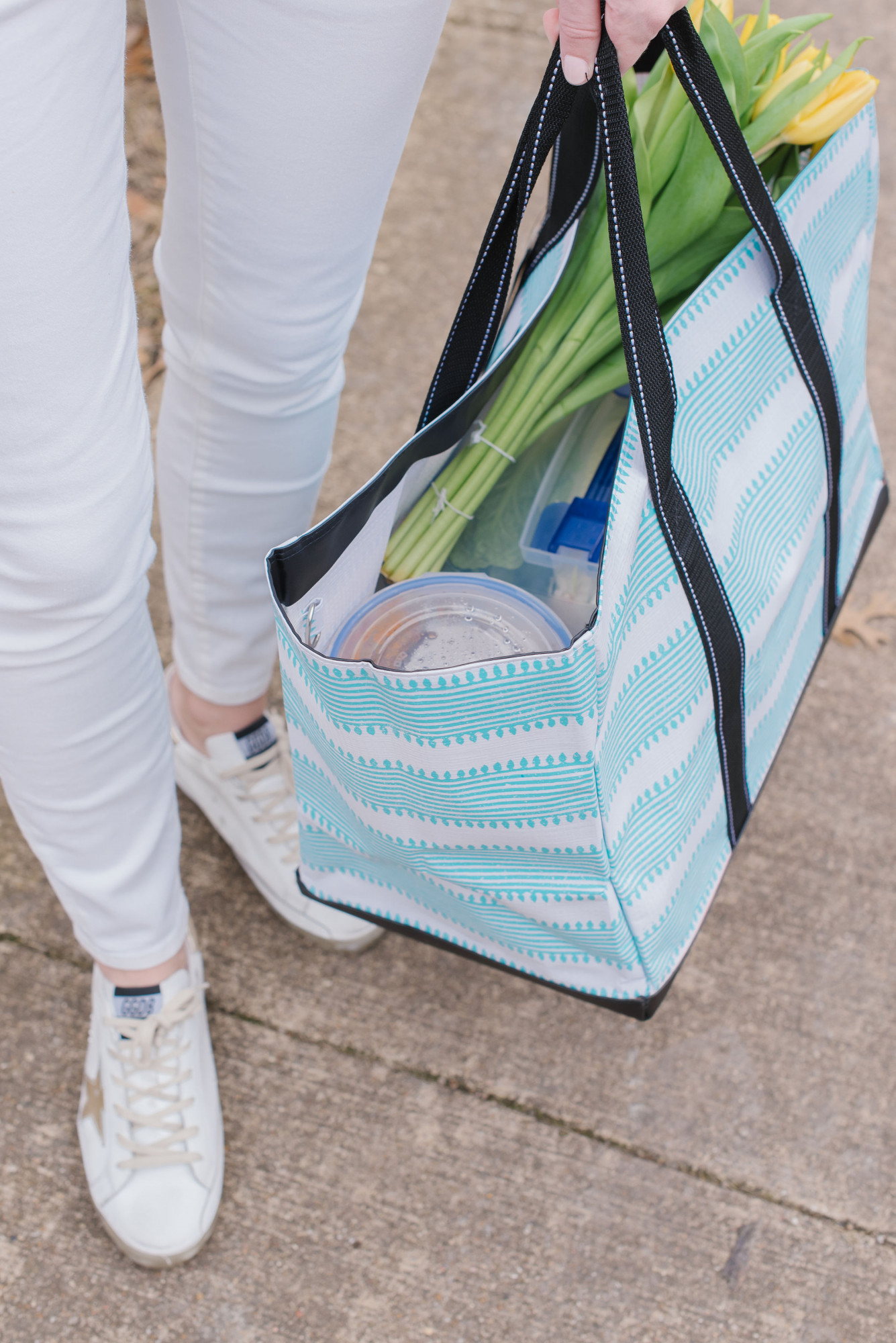
The heart of DoSayGive is sharing what to graciously do, say, and give in both times of joy and sadness. I receive so many emails from readers asking what to do when a friend unexpectedly loses a loved one or experiences some other kind of tragedy. So today I am sharing actionable items you can do to help and love those friends in those first few days and weeks.
1. Know Your Place
First, it is so important to consider your relationship to the person at the center of the tragedy so you don’t overstep physical or emotional boundaries. The ring theory is very helpful to me in this regard. How does it work? Draw a ring around the person at the center of the tragedy. Then draw a second ring around the first ring and put her family inside (siblings, parents, etc.). Draw a third ring that includes close friends. The next outer ring would probably be neighbors and acquaintances from her children’s school and church. You get the idea. Now ask yourself which ring you belong in.
The theory goes that you need to “comfort in, vent out.” In other words, don’t give advice to the people closer to the tragedy, just offer a listening ear and comfort. If you need to talk about the tragedy (not in a gossipy way) or share about a similar experience you had, go to someone in a circle outside the one you are in (and never go to social media!).
For example, if you see the friend or acquaintance at the funeral or even at the grocery store a few weeks after the tragedy, you don’t need to accost her and ask her “all the details.” A comforting hug and a simple “I am so sorry for your loss” or “We are here for you” is sufficient. If she wants to open up, she will.
This isn’t part of the original theory, but I think the ring theory goes for actions in addition to words, particularly as you look back toward the center of the tragedy.
For example, if your best friend’s sister loses her spouse tragically you do not need to jump over several rings to be most helpful. You can provide for your best friend’s immediate needs while she uses up emotional and physical energy tending to her sister. Providing her sustenance with meals, rides for children, etc. can be such a gift to her and her family.
Another tip: I also think it’s worth asking if the person at the center of the tragedy even has family nearby to be that second “ring” and really that first line of comfort (and defense against Nosy Nancys!). Sometimes when family isn’t in the picture close friends need to draw even closer.
2. Do Something
So often after a tragedy we ask, “should I do something, should I go over to her house, should I call?” I wrote blog post when I first started blogging called “Just Go.” And it was advice my grandmother gave me when I asked her if I should go to a good friend’s house after a tragedy. I suggest that if you are among the person’s five or so closest friends (or if you just feel strongly led by the Holy Spirit!) then I would go be present with that friend. That’s just my number so obviously use your good judgement in each situation and look for social cues when the person or family needs space. But, please, never have your feelings hurt if you are turned away. Trust me, knowing that you showed up means so much.
If you aren’t a close friend, there are other things you can do to show your care and concern. Below is a breakdown of things you can offer to do.

Tip: always offer specific things to friends in these situations. “Let me know if I can do anything to help” is actually one of the most unhelpful phrases.
Things Good Friends Can Offer to Do:
- Be present to comfort
- Help with children
- Set up meal and/or care calendar
- Put a cooler on their front porch
- Laundry, clean house, buy funeral attire, organize post funeral food
- Help with hospital, legal, funeral paperwork
- Care for pets
- Order stationery for later thank you notes
- Write or address thank you notes
- Deter exhausting conversations at funerals/visitations
Things Acquaintances Can Do (Church, School, Work, Neighbor):
- Sign up for the meal calendar
- Drop off dinner, lunch foods or groceries (ideally just leave on porch). Tip: people usually receive tons of cookies and sweets so consider nutritious things that can be used for snacking and meals like fruits and veggies, various salads, deli meats, etc.)
- Drop off paper plates, napkins, disposable utensils, and/or bottled water
- Offer to take a child home to and from school or activity
- Drop off activities for young children
- Coordinate playdates in the coming weeks for children (if wanted)
- Send a card
- Pray
- Send flowers to funeral from group
- Offer to cater the post-funeral luncheon
- Have class write letters and cards.
*Remember point #1 about helping the people in the second “ring” because they need rest and nourishment, too! Many of these things can be helpful to them as well.

3. Give without expecting anything in return.
When someone is in the midst of a tragedy she is probably struggling to get one foot in front of the other. And it can be completely overwhelming to receive hundreds of texts, phone calls, and emails in a matter of days. It is truly a selfless gift on your part to give the above things without any expectations. It is one more way we can be helpful and love her well. So:
- Don’t text/call/email to arrange a drop-off time for your meal. They have too much to coordinate already! Ideally someone will leave a cooler on the porch for all meals. If not, leave your cooler with the meal inside and a note saying you will pick up the next day if she will put back on the porch.
- Don’t text/call/email asking if they received your meal. They did. Don’t fish for a thank you.
- Don’t text/call/email asking if they got your first text. Are you catching my drift now about the texts??
- When you drop food off leave on porch and don’t ring the bell. If they want to visit, they will make an effort to do so.
- Have grace if they don’t send a thank you. If there was ever an exception to thank you note etiquette it is these situations!
- Don’t tell them about a difficult situation you are facing or faced or compare situations. Remember, go outside the circle!
4. Keep the Love Going
It feels so good to be helpful in the immediate aftermath of a tragedy, but once our meal calendar date has passed that friend might slip from our thoughts. So go ahead and make a few calendar dates to remind yourself to call the friend and catch up, to remember to send a note on the year anniversary, and to ask out to dinner. Check in somehow. It will be most appreciated.
We will have more posts this spring about specific things to say and give as well as a post specifically about helping a friend who lost a child. Subscribe to our email list so you can be lovely and gracious in everything you do, say, and give. And these posts might be helpful too:
What to Do For a Friend on Bed Rest
What to do for a Friend with Cancer
What to Say in a Sympathy Card
What to Do When a Friend is Grieving the Death of A Child
Any tips to add? Comment below. And, as always, I am most grateful if you share any helpful posts with friends on Facebook!
Photos: Audrie Dollins




Beautifully said, Lee and all perfectly put. Thank you for writing this important and helpful post!
Thank you, friend!! And thanks for being such an example of a gracious and loving friend.
This is so helpful! Thank you for putting this list together, Lee!
I am so glad it was helpful!
Thank you for the thoughtful post. I was beyond lucky to have such great, helpful friends (yourself included!) during our time of need.
I am glad you think it was on point. You taught me a lot with your grace and kindness to others during such a difficult time.
LOVE this…..the “ring” theory is perfect ❤
Thank you so much!
During the Nordstrom Anniversary Sale, I buy several Barefoot Dreams blankets and sweaters. I like to have them on hand to take to a friend when they are going through a difficult time. It’s such a nice gift, and buying them in advance saves time and money!
Such a great idea! Thanks for sharing!
Every person’s physical and emotional needs are different, but i might disagree about not coordinating your meal before dropping it off. We lost my father last weekend, so this is very fresh on my mind. Our friends and family were abundantly generous to my immediate family, but we had to throw away so much food because so many people delivered meals the first day or two. Although we deeply appreciated the heart behind it, the food became a burden because the freezer and refrigerator were full and we couldn’t possibly eat that much food. Maybe coordinating with someone other than those in the inner rings would be better than being in constant contact with those at the center, but checking in with someone who knows what’s going on isn’t a bad idea.
I am so sorry about your loss. I maybe should clarify that I was talking about people who have specifically signed up for meal calendars texting to set up a drop off time. I think meal and care calendars are very helpful!! And, yes, agree to check in with someone in the inner rings because the amount of food can be overwhelming. Thanks so much for your insight.
To add to your point about paper plates and utensils, toilet paper and hand soap for the bathroom are also a great help. Maybe washing power if a large number of family will be staying together.